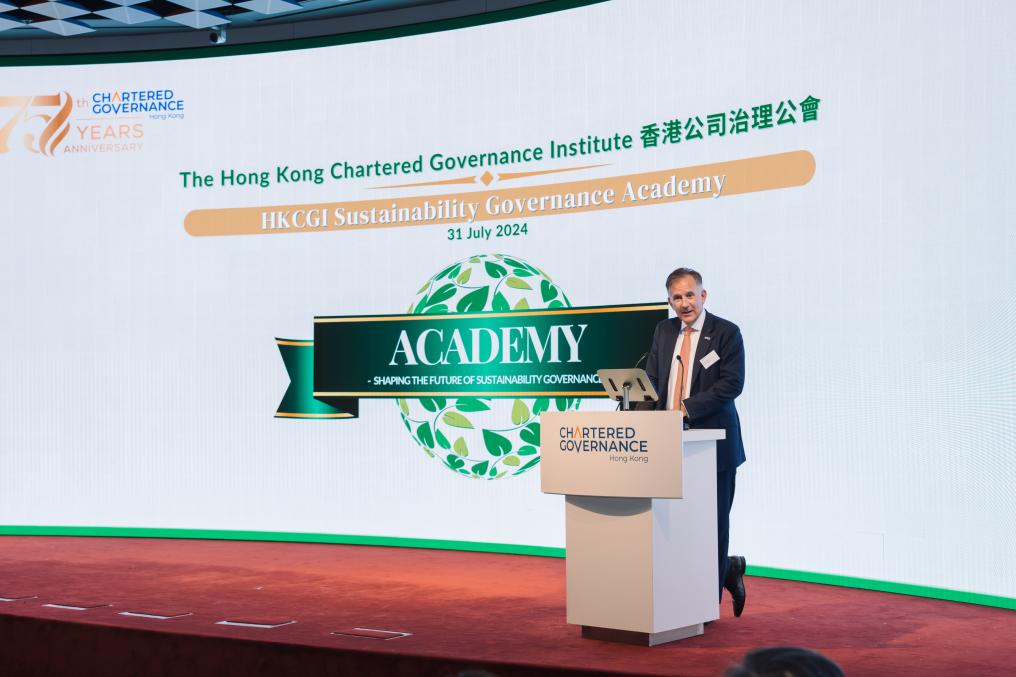On 31 July this year, the Institute launched a new platform for continuous learning, networking and collaborative problem-solving in sustainability. CGj looks at the significance of this new initiative and at the issue at the top of the agenda for sustainability professionals in Hong Kong – the upcoming climate-related disclosure requirements of the Listing Rules.
Highlights
- building market capacity through the improvement of knowledge and awareness of sustainability and ESG issues is an urgent task for Hong Kong
- the Institute’s Sustainability Governance Academy is part of a collective effort to cultivate the skills and knowledge necessary to drive meaningful change
- by investing in the development of specialised expertise, organisations can position themselves at the forefront of the sustainability revolution
Sustainability is one of the most complex challenges facing organisations today, and the need to ensure the right level of expertise to address this challenge has been climbing the agenda for organisations around the world. Directors, managers and professional practitioners involved in managing and/or overseeing sustainability practice and strategy need to stay ahead of fast-moving developments in a wide range of different areas – including climate change and carbon emissions, stakeholder engagement, supply chain management, and metrics and reporting. This means staying up to date with the latest sustainability-related laws, regulations and standards, as well as emerging technologies (such as those in renewable energy, energy storage and clean transportation), and sustainability-focused research and thought leadership.
Into this space comes the Institute’s Sustainability Governance Academy (Academy). In his welcoming speech at the Climate-related Disclosure Update seminar and Academy launch, held at the Hong Kong Exchanges and Clearing Limited (HKEX) Connect Hall on 31 July, David Simmonds FCG HKFCG, Institute President and Chief Strategy, Sustainability and Governance Officer, CLP Holdings Ltd, pointed out that the Academy builds on the community forged by the Institute in running its ESG Reporting Certification Course (Certification Course) in February 2023.
All certificate holders of the Certification Course are eligible to register as Sustainability Professionals under the Academy free of charge, and Mr Simmonds emphasised that those doing so will be taking the next logical step in both developing and demonstrating their professional competency in this area. Graduates of the Certification Course have the knowledge and expertise they need to advise on the many different areas relevant to sustainability and practice, but joining the Academy adds the vital ingredient of ongoing collaboration and knowledge-sharing with other sustainability professionals.
‘We didn’t want the Certification Course to be a full stop for the many passionate advocates of sustainability in Hong Kong and the Chinese mainland,’ Mr Simmonds said. ‘We want to provide a home for sustainability professionals and for everyone who wants to better understand the nuts and bolts of ESG reporting and why it matters. The Academy will provide a platform for continuous learning, sharing best practices, networking and creative interaction, as well as providing a go-to resource on ESG sustainability, governance and reporting issues. We believe that this platform will be extremely valuable in supporting the development of capability in the market and in assisting us all to navigate what is a very significant new area of regulation.’
“We believe that this platform will be extremely valuable in supporting the development of capability in the market and in assisting us all to navigate what is a very significant new area of regulation.”
David Simmonds FCG HKFCG
Institute President and Chief Strategy, Sustainability and Governance Officer, CLP Holdings Ltd
He added that sustainability professionals are much better recognised now as essential enablers of long-term value creation within organisations, and enhancing their knowledge and effectiveness will make a major contribution towards better sustainability practices in the market. ‘We want to help businesses build trust through the better governance of sustainability,’ he said.
Market capacity building – a collective effort
In March this year, the government issued a statement which set out the vision and approach for Hong Kong to develop a comprehensive sustainability disclosure ecosystem. The Hong Kong Institute of Certified Public Accountants (HKICPA) is being tasked to develop local sustainability disclosure standards, which are expected to be aligned with the IFRS S1 and S2 standards issued in June 2023 by the International Sustainability Standards Board (ISSB).
Both HKEX and the Securities and Futures Commission (SFC) have been enthusiastic supporters of the above goals. Michael Duignan, Executive Director, Corporate Finance, SFC, a guest speaker at the Academy launch, congratulated the Institute on the launch of the Academy, pointing out that building market capacity through the improvement of knowledge and awareness of sustainability and ESG issues is an urgent task for Hong Kong.
‘The Institute undeniably plays an instrumental role in improving ESG reporting comprehension and skills. Today we applaud the inauguration of the Institute’s Sustainability Governance Academy, a significant stride towards cultivating professional skills in this field and offering a beneficial platform for knowledge exchange. The Academy is a significant landmark in the Institute’s efforts towards championing sustainability through advocacy, education and research,’ he said.
Ultimately, however, it is the responsibility of organisations themselves to ensure they have the expertise they need to address sustainability issues and Mr Duignan emphasised that this should be a strategic goal and high priority for entities in Hong Kong. By investing in the development of specialised expertise in this area, organisations can position themselves at the forefront of the sustainability revolution, he said.
He added that capacity building can take many forms, including the establishment of dedicated sustainability departments within organisations, the implementation of comprehensive training programmes for employees, and the fostering of collaborative partnerships with sustainability experts and industry associations.
‘This holistic approach not only addresses the immediate challenges, but also lays the foundation for long-term, sustainable success, positioning organisations as leaders in their respective fields and driving positive change for the betterment of our planet and society,’ he said.
Preparing for Hong Kong’s incoming ESG Code
While the end goal is to have the local sustainability disclosure standards adopted across all sectors of the economy in Hong Kong, the listed company sector will be in the vanguard and participants in the Institute’s Climate-related Disclosure Update seminar, held immediately before the launch of the Academy, were fortunate to have Kelly Lee, Senior Vice President, Policy and Secretariat Services, Listing Division, HKEX, to highlight how companies can prepare for the new Listing Rule regime relevant to climate change disclosure.
The new requirements set out in the ESG Code will come into effect in a phased schedule from 1 January 2025 and Ms Lee urged seminar participants to access the guidance materials on the HKEX website, in particular the Implementation Guidance for Climate Disclosures under HKEX ESG Reporting Framework, to help them prepare for the incoming regime.
A key aim of the Institute’s Certification Course is to provide participants the essential information that companies, and those advising them, need in their preparations for Hong Kong’s incoming regulatory regime relevant to climate change disclosure.
Aligning with the ISSB standards
A core goal of Hong Kong’s incoming ESG Code is to align with the IFRS S1 and S2 standards issued by the ISSB. The second speaker at the seminar, Teresa Ko BBS JP FCG HKFCG, Senior Partner, Hong Kong and China Chairman, Freshfields Bruckhaus Deringer; Vice-Chair, IFRS Foundation, urged participants to be proactive and start their journey to full compliance with the ISSB standards now.
‘Hong Kong is developing a road map to provide a transparent and well-defined pathway to develop local sustainability disclosure standards and this is being done by the HKICPA. These standards will be aligned with the ISSB standards, so the direction of travel is very clear – you can wait to be told what to do later, or you can be proactive and start the journey now,’ she said.
“The direction of travel is very clear – you can wait to be told what to do later, or you can be proactive and start the journey now.”
Teresa Ko BBS JP FCG HKFCG
Senior Partner, Hong Kong and China Chairman, Freshfields Bruckhaus Deringer;
Vice-Chair, IFRS Foundation
She added that, since the ISSB standards are only one year old, nobody is behind. In fact, 2025 will be the first year that sees the publication of ISSB compliant reports. ‘We’re starting from the same sprinting line,’ she said.
She went on to outline five reasons why companies will benefit from adopting the ISSB standards.
1. Continuity with previous standards. While the ISSB standards were published in 2023, they are built on standards already widely adopted in markets around the world, including the recommendations published by The Task Force on Climate-related Financial Disclosures (TCFD) and the standards published by The Sustainability Accounting Standards Board (SASB), which in 2021 merged with the International Integrated Reporting Council to create the Value Reporting Foundation. ‘Trying to streamline what there is in the world has been in our DNA from the get go,’ Ms Ko said.
2. Supplying the information investors need. Since the ISSB itself was created for global investors, and both IFRS S1 and S2 were the product of extensive outreach and feedback from global investors, organisations compliant with the standards can be confident that the information they are supplying in their reports is the information that global investors want. Ms Ko pointed out that entities that comply with the ISSB standards will therefore be better able to attract global investors and global capital.
3. Harmonising standards. The ISSB is trying to reduce the duplication of the many different sustainability disclosure frameworks available globally. Its mission is to create a global baseline of sustainability-related financial disclosure to enable comparability and reliability. Ms Ko emphasised that this consolidation has brought significant benefits for reporting entities in terms of the reduction of their disclosure burdens.
4. Focusing on sustainability strategy. An even more significant benefit for reporting organisations complying with the ISSB standards, Ms Ko pointed out, is that the process they need to go through helps them identify their strategic value drivers and ensures that their business models and assets are well positioned to create value for companies for the long term. She emphasised that the ISSB standards should not be seen only as a compliance exercise – they can help companies recognise their material risks and opportunities going forward.
5. Interoperability. While the ISSB standards have achieved a level of consolidation of the various sustainability reporting standards around the world, this journey is by no means over. The IFRS Foundation, Ms Ko said, recognises that interoperability is still a work in progress and discussions are ongoing with jurisdictions and other leading standard setters such the Global Reporting Initiative (GRI) and the CDP (formerly known as the Carbon Disclosure Project) to ensure consistency across reporting requirements and to reduce complexity, fragmentation and barriers to comparability, which may undermine the usefulness of sustainability information in decision-making.
This issue was raised in the Q&A following Ms Ko’s presentation. Edith Shih FCG(CS, CGP) HKFCG(CS, CGP) (PE), Past International President, Institute Past President and Honorary Advisor, and Executive Director and Company Secretary, CK Hutchison Holdings Ltd, a panellist at the seminar, pointed out that multinational companies such as her own, are still subject to many different regulations relevant to ESG and sustainability disclosures.
Companies doing business in Europe, for example, need to consider many different EU regulations, such as the European Climate Law, the EU Deforestation Regulation and the standards published by the European Financial Reporting Advisory Group.
Ms Shih emphasised the importance of practitioners staying on top of the compliance requirements their organisations are subject to, but she added that having a comprehensive set of standards subscribed to by all relevant parties would help to ensure that the burden of compliance does not keep increasing.
Practical challenges
In addition to the interoperability issue discussed above, the Q&A session at the end of the seminar addressed a number of practical challenges organisations might encounter in their compliance journeys.
Materiality assessments
Identifying what information is material for an organisation’s stakeholders is no simple task. The Q&A addressed in particular the issue of how companies can address the different approaches taken to materiality assessments in the multiple frameworks still relevant to reporting organisations around the world. The ISSB standards adopt a single materiality approach, but many other standards (including the GRI for example) have adopted a double materiality approach. Hong Kong’s Listing Rules have aspects of both approaches and Ms Lee was asked how companies can reconcile these differences.
She explained that the materiality threshold required for the purposes of climate-related disclosures under Part D of the Listing Rules aligns with the ISSB standards and is a minimum threshold. HKEX recognises that listed companies should be reporting on issues that are material to their wider stakeholder base and the existing materiality principle in the ESG Code is therefore widely defined to encompass different materiality considerations.
Gill Meller FCG HKFCG(PE), International Vice President, Institute Past President, and Legal and Governance Director, MTR Corporation Ltd, a panellist at the seminar, pointed out that getting the enterprise value approach to materiality right – financially quantifying the potential impacts that climate change could have on the business – will require a much closer working relationship between teams (in particular the sustainability and finance teams) within the organisation.
She added, however, that companies have at their disposal an impressive level of resources and training to gear up for the incoming regulatory regime. In addition to the materials made available online by regulatory bodies in Hong Kong, platforms like the Institute’s Sustainability Governance Academy will be a great resource for collaborative information sharing.
She emphasised that getting the right level of expertise, both on the board and at all levels within the organisation, will be a key part of organisations rising to the challenges ahead, and she urged companies to bear in mind the need for ESG and sustainability expertise on the board when looking for new directors.
Implementation reliefs
HKEX will also introduce implementation reliefs to address the concerns over the reporting challenges that some issuers may face. As listed companies are at different stages of their reporting journeys, some may require additional capabilities and resources to comply with the new climate disclosure requirements. ‘We don’t expect everyone to come up with a perfect report from the beginning,’ Ms Lee explained.
Companies should bear in mind, however, that their use of reliefs cannot be a static thing, she added. They will need to reassess their situation every year to see whether the implementation reliefs are still relevant and applicable to them.



